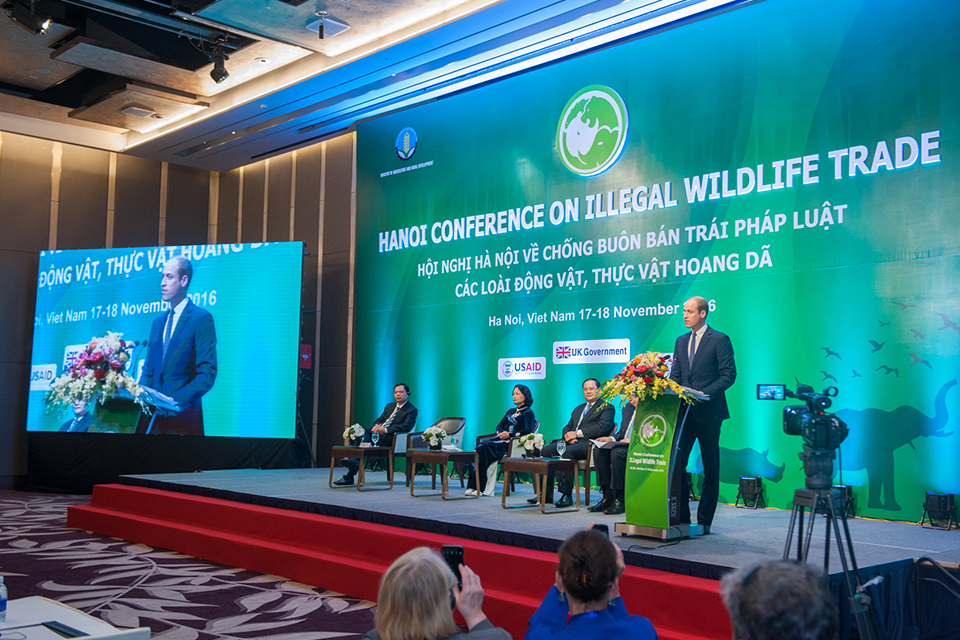UK-Vietnam work together to tackle illegal wildlife trade: Article by Giles Lever
British Ambassador to Vietnam writes about the strong shared interest of the UK and Vietnam in working together to keep driving forward progress towards tackling illegal wildlife trade.

One of the highlights of my time as British Ambassador to Vietnam was last November’s high-level conference on the illegal wildlife trade in Hanoi, when Prince William and our Environment Minister joined representatives of 42 other countries and 11 international organisations. This week, the British government announced that a year from now, on 10-11 October 2018, the UK will host the next high-level meeting of this global coalition against the illegal wildlife trade.
As the incoming and outgoing chairs, the UK and Vietnam have a strong shared interest in working together to keep driving forward progress. A milestone on the road to the London conference will be the progress report which Vietnam will publish next month. This will set out what countries and organisations have done, one year on, to fulfil the commitments they made in Hanoi. So this is a good time to reflect on how we are doing in the fight against the illegal trade in endangered species and wildlife products.
In some ways, the Hanoi conference was a moment for optimism, as Vietnam stepped forward, on behalf of Asian countries, to host the event, and in the process attracted new Asian participants such as Mongolia and Myanmar. And I felt a real sense of hope as I took part in Vietnam’s first ever destruction of part of its stockpile of seized ivory and rhino horn, and as a coalition of excellent Vietnamese and international NGOs came together to make their voices heard.
The UK was among the countries that made new commitments to action at Hanoi, including Viet Nam, Indonesia, and Malawi. But since then, we have decided to go even further, with the British government recently announcing plans for a total ban on the domestic sale of ivory, closing loopholes in current regulations. This is an important signal of our determination to continue to lead by example on this issue.
But the reason why we need to take such measures, and why next year’s conference in London is needed, is that globally, the battle against the illegal wildlife trade is not yet being won. Wild populations of elephants, rhinoceros and other iconic species are being poached at an unsustainable rate, fuelled by in large part by demand in Asia. And this is not just a problem for iconic species far away. Asia’s and Vietnam’s wondrous biodiversity is equally under pressure. The slow loris is increasingly under threat for the pet trade, the trade in tiger parts continues and pressure on habitats mean that many species of langurs unique to Vietnam are now listed as critically endangered. Such is the threat facing our wildlife that scientists now talk of us being in the 6th great phase of extinction.
So what can we do about this? As governments, we need to recognise that the groups involved in trafficking wildlife products represent a serious international organised crime threat, not only a threat to wildlife, and respond accordingly. This means building country-level capability and will to enforce our national laws against the trade – something that countries like the UK can help with, as we did through September’s bilateral workshop between UK and Vietnamese customs, police and transport experts. But while national action remains essential, only international collaboration will allow us to bring down the kingpins of the illegal trade. Helping bring about more cross-border cooperation to disrupt the trade will therefore be a priority in the year leading up to the London conference. Again, Vietnam is setting a good example through its MoU with Mozambique on this issue.
But government and law enforcement alone cannot solve the problem. There would be no illegal trade without demand. Civil society, experts in conservation and traditional medicine, and leaders from the worlds of business and entertainment have a key role to play in speaking out, and creating a culture in which display and consumption of illegal products is no longer seen as fashionable or acceptable. It has been a real pleasure for me to join events with great Vietnamese NGOs like Education for Nature Vietnam and Save Vietnam’s Wildlife and to see all that they are doing to educate and inform the public. Likewise, it was both an honour and an education for me to appear on VTV’s Cafe Sang programme recently with Nguyen Xuan Huong, Doctor of Traditional Medicine, Former President of Vietnam Orientally Traditional Medicine Association to hear him explain why rhino horn had no legitimate role in traditional Eastern medicine. But we need to redouble these efforts if we are to continue to drive down demand.
We will not get rid of the illegal wildlife trade in the next year. But, so long as the UK, Vietnam and other countries continue to display commitment and ambition, I’m confident that by the time of the 2018 conference in London, we can make real progress in national, regional and global efforts to preserve our planet’s precious biodiversity for future generations to enjoy, and put an end to the criminal enterprises that threaten it.